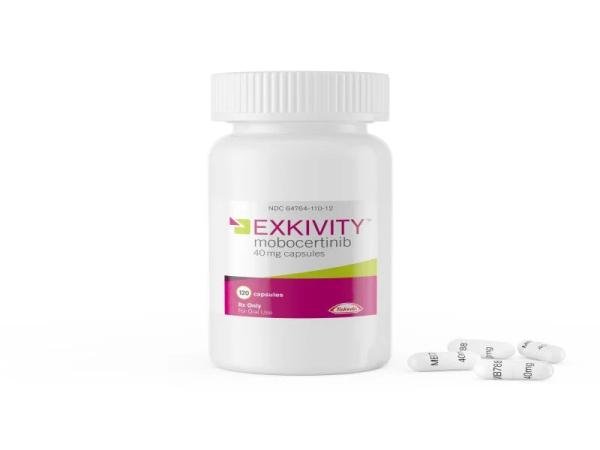Mobocertinib Disease Interactions
There are 5 disease interactions with mobocertinib.
Mobocertinib (applies to mobocertinib) QT prolongation
Major Potential Hazard, Moderate plausibility. Applicable conditions: Heart Disease, Electrolyte Abnormalities, Hypocalcemia, Hypokalemia, Hyponatremia, Magnesium Imbalance
Mobocertinib can cause life-threatening QTc prolongation, including torsades de pointes, which can be fatal, and requires monitoring of QTc and electrolytes. QTc and electrolytes should be assessed at baseline and abnormalities in sodium, potassium, calcium, and magnesium should be corrected before starting mobocertinib. QTc and electrolytes should be monitored periodically during therapy. Monitoring frequency should be increased in patients with risk factors for QTc prolongation (such as patients with congenital long QT syndrome, heart disease, or electrolyte abnormalities); caution is recommended in these patients. Therapy should be withheld, the dose should be reduced, or mobocertinib should be discontinued based on the severity of QTc prolongation.
Mobocertinib (applies to mobocertinib) cardiac toxicity
Moderate Potential Hazard, Moderate plausibility. Applicable conditions: Cardiomyopathy, Congestive Heart Failure
Mobocertinib can cause cardiac toxicity (including decreased ejection fraction, cardiomyopathy, and congestive heart failure) resulting in heart failure which can be fatal. Cardiac function (including assessment of left ventricular ejection fraction) should be monitored at baseline and during therapy. Therapy should be withheld, the dose should be reduced, or mobocertinib should be discontinued based on the severity of decreased ejection fraction or heart failure.
Mobocertinib (applies to mobocertinib) hepatic impairment
Moderate Potential Hazard, Moderate plausibility. Applicable conditions: Liver Disease
No dosage adjustment of mobocertinib is recommended for patients with mild (total bilirubin up to the upper limit of normal [ULN] and AST greater than ULN or total bilirubin greater than 1 to 1.5 times ULN [1 to 1.5 x ULN] and any AST) or moderate (total bilirubin 1.5 to 3 x ULN and any AST) liver dysfunction. The recommended dosage of mobocertinib has not been established for patients with severe liver dysfunction (total bilirubin greater than 3 times ULN and any AST); caution is recommended in these patients.
Mobocertinib (applies to mobocertinib) ILD/pneumonitis
Moderate Potential Hazard, Moderate plausibility. Applicable conditions: Pulmonary Impairment
Mobocertinib can cause interstitial lung disease (ILD)/pneumonitis, which can be fatal. Care should be exercised when using this drug in patients with preexisting pulmonary impairment. Mobocertinib should be immediately withheld in patients with suspected ILD/pneumonitis and permanently discontinued if ILD/pneumonitis is confirmed. Patients should be monitored for new/worsening pulmonary symptoms indicative of ILD/pneumonitis.
Mobocertinib (applies to mobocertinib) renal impairment
Moderate Potential Hazard, Moderate plausibility. Applicable conditions: Renal Dysfunction
No dosage adjustment of mobocertinib is recommended for patients with mild to moderate renal dysfunction (estimated glomerular filtration rate [eGFR] 30 to 89 mL/min/1.73 m2 by Modification of Diet in Renal Disease equation). The recommended dosage of mobocertinib has not been established for patients with severe renal dysfunction (eGFR less than 30 mL/min/1.73 m2); caution is recommended in these patients.
Switch to professional interaction data
Mobocertinib drug interactions
There are 563 drug interactions with mobocertinib.
Mobocertinib alcohol/food interactions
There is 1 alcohol/food interaction with mobocertinib.
More about mobocertinib
- mobocertinib consumer information
- Check interactions
- Compare alternatives
- Side effects
- Dosage information
- During pregnancy
- Drug class: EGFR inhibitors
- En español
Related treatment guides
Drug Interaction Classification
| Highly clinically significant. Avoid combinations; the risk of the interaction outweighs the benefit. | |
| Moderately clinically significant. Usually avoid combinations; use it only under special circumstances. | |
| Minimally clinically significant. Minimize risk; assess risk and consider an alternative drug, take steps to circumvent the interaction risk and/or institute a monitoring plan. | |
| No interaction information available. |
See also:
Further information
Always consult your healthcare provider to ensure the information displayed on this page applies to your personal circumstances.


